A three-day national workshop titled “Vulture Guardians: Workshop on Rescue, Rehabilitation and Conservation” was conducted from 14th to 16th July 2025 at Seven & Seven Hotel & Resort, Bhopal. It was organized by the Bombay Natural History Society (BNHS) in collaboration with the Madhya Pradesh Forest Department and Van Vihar National Park & Zoo, with support from the Ministry of Environment, Forest and Climate Change (MoEF&CC), Government of India.
The workshop brought together 29 participants from nine Indian states, comprising veterinarians, biologists, researchers, and wildlife rescuers. The event was inaugurated by Shri Vijay Kumar, IFS, Field Director, Van Vihar National Park, who emphasized the vital ecological role vultures play in controlling disease outbreaks through carrion disposal. Dr. Sujit Narwade, Deputy Director, BNHS, delivered the keynote, stressing the importance of inter-agency collaboration and scientific efforts for vulture recovery in India.
Technical Lectures And Sessions
Dr. Kazveen Umrigar, Conservation Breeding Expert at BNHS, presented “Understanding Vultures: Nature’s Cleanup Crew”. Her session explored the biological and ecological significance of vultures, describing them as obligate scavengers with unique adaptations such as bald heads and strong stomach acids to consume decomposing carcasses. She detailed their slow reproductive rates and role in disease control, emphasizing how vulture decline can impact public health and economy. The cultural and religious value of vultures to communities like Parsis and Tibetan Buddhists was also highlighted.
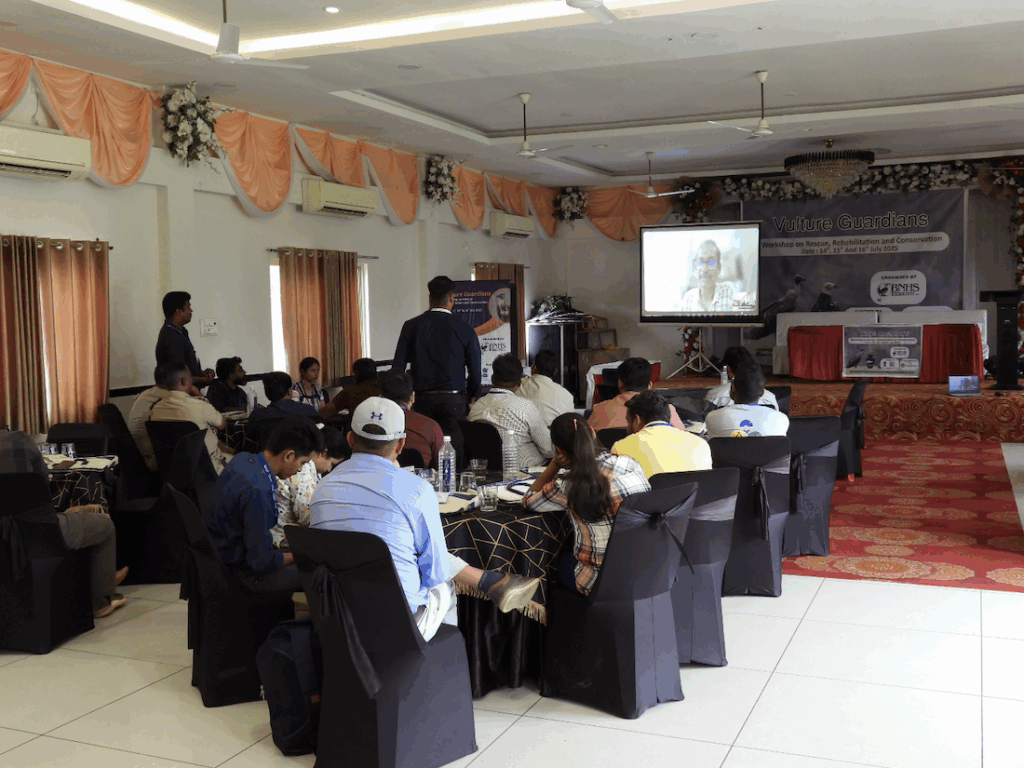
Mr. Sachin Ranade, Assistant Director, BNHS, discussed “The Silent Crisis: Decline of Vulture Populations and the Need for Conservation”. He traced the timeline of Gyps vulture decline, linking it to the veterinary use of diclofenac. He presented evidence from India and Pakistan on NSAID-related mortality and explained the outcomes of the landmark 2004 study in Nature. Mr. Ranade emphasized safe alternatives like meloxicam and shared updates on the South Asian Vulture Recovery Plan. He outlined the progress and challenges faced at the four BNHS-managed VCBCs—Pinjore, Raja Bhatkhawa, Guwahati, and Bhopal.

Dr. Arockianathan Samson, Centre Manager, BNHS-VCBC Bhopal, led a session on “Bird Identification – Recognizing Vultures and Other Birds”. He explained key differences between vultures and other raptors such as eagles, covering morphology, flight behavior, and habitat. Participants were introduced to the nine vulture species found in India, along with their physical traits, wing spans, nesting habits, and distribution maps. The importance of accurate identification for fieldwork, breeding programs, and policy planning was stressed.
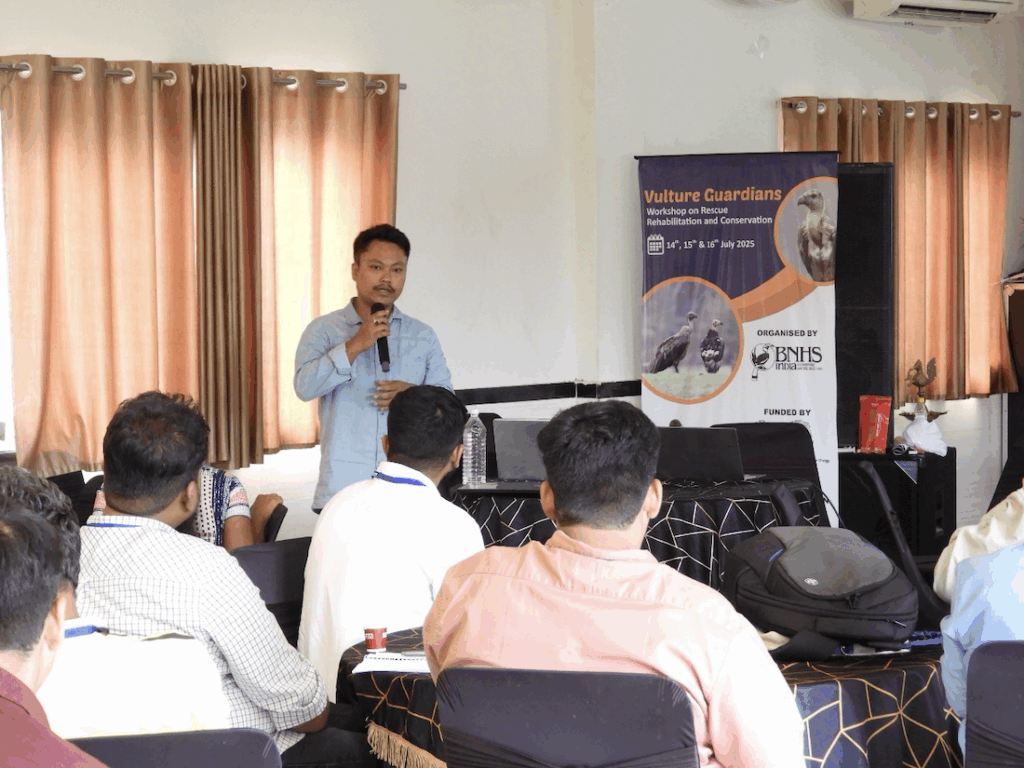
Dr. Krishna Mohan Chutia, Veterinarian, BNHS-VCBC Assam, presented “The Right Way to Rescue, Transport, and Administer Basic Care to Vultures”. He demonstrated safe vulture capture techniques using towels, nets, and secure holds to minimize stress. First aid protocols such as wound management, crop flushing, and emergency drug use were explained. Dr. Krishna also outlined safe transportation methods and housing conditions to support recovery. He emphasized that veterinarians, forest officials, biologists, and local communities must work together for successful rescues.
Field Visits

Participants visited Van Vihar National Park, where they toured tiger, leopard, sloth bear, and crocodile enclosures, butterfly and snake parks, and observed nesting wetland birds like storks and herons. At the Interpretation Centre, the Assistant Director presented a documentary and hosted an interactive session. The group also explored the park’s veterinary facilities, including rescue and treatment areas.
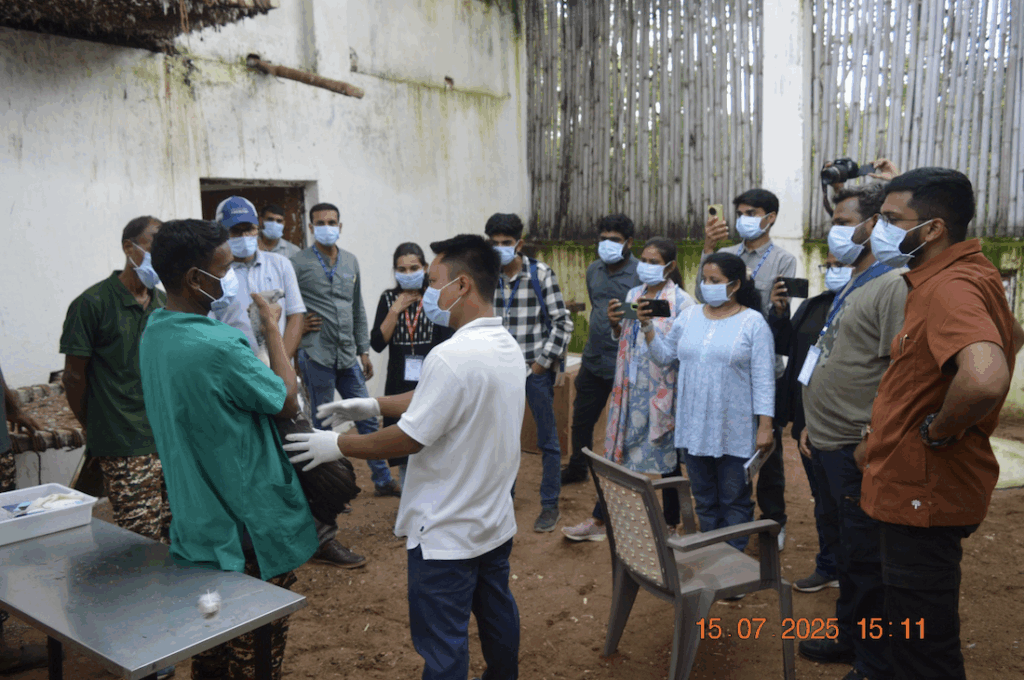
At the Vulture Conservation Breeding Centre (VCBC), Bhopal, participants witnessed practical demonstrations on vulture capture, handling, and morphometric measurements. Equipment such as nets, transport crates, and safety tools were displayed. The team explained artificial incubation tools including incubators, candlers, weighing scales, and the Egg Buddy, detailing their use in egg viability monitoring. A CCTV-guided tour of aviaries showcased nest structures, hygiene measures, and internal behavioral monitoring protocols.
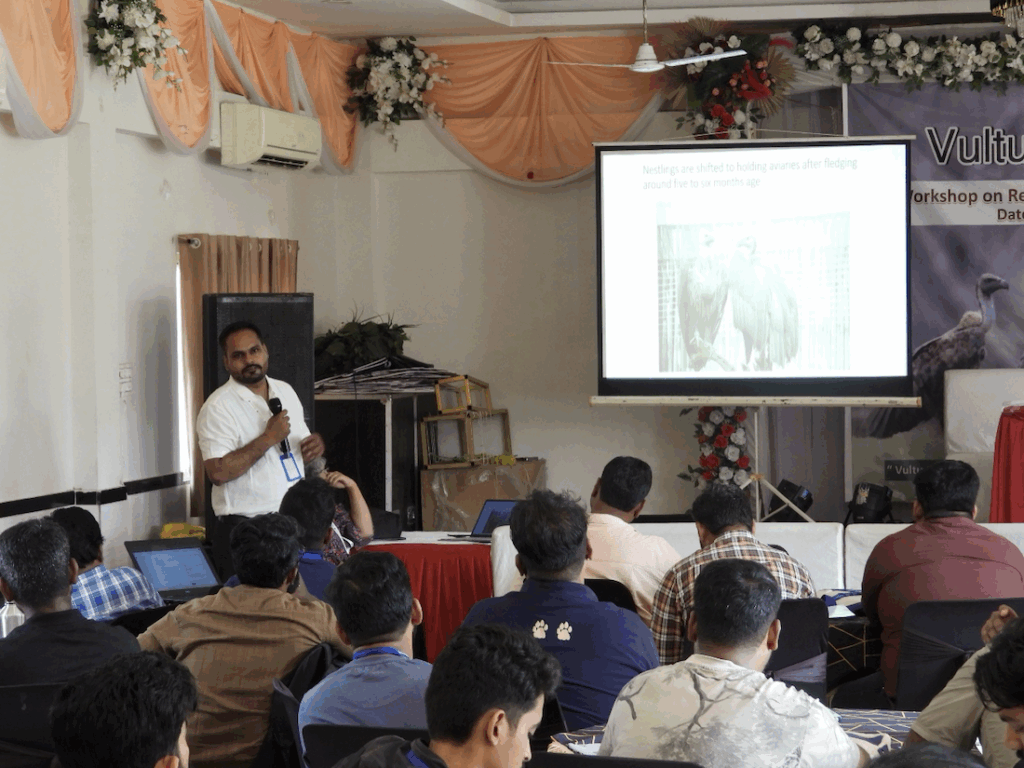
Mr. Hemant Bajpai, from BNHS-JCBC Pinjore, gave a detailed talk on “Care of Vultures in Captivity – Husbandry and Breeding”. He described the breeding centre layout, aviary types (quarantine, holding, colony), and behavioral monitoring methods. Key topics included incubation, chick rearing, feeding, health assessments (blood tests, X-rays), and protocols for shifting chicks to pre-release aviaries. He shared experiences from VCBC Pinjore and highlighted the importance of cleanliness, environmental enrichment, and record-keeping.
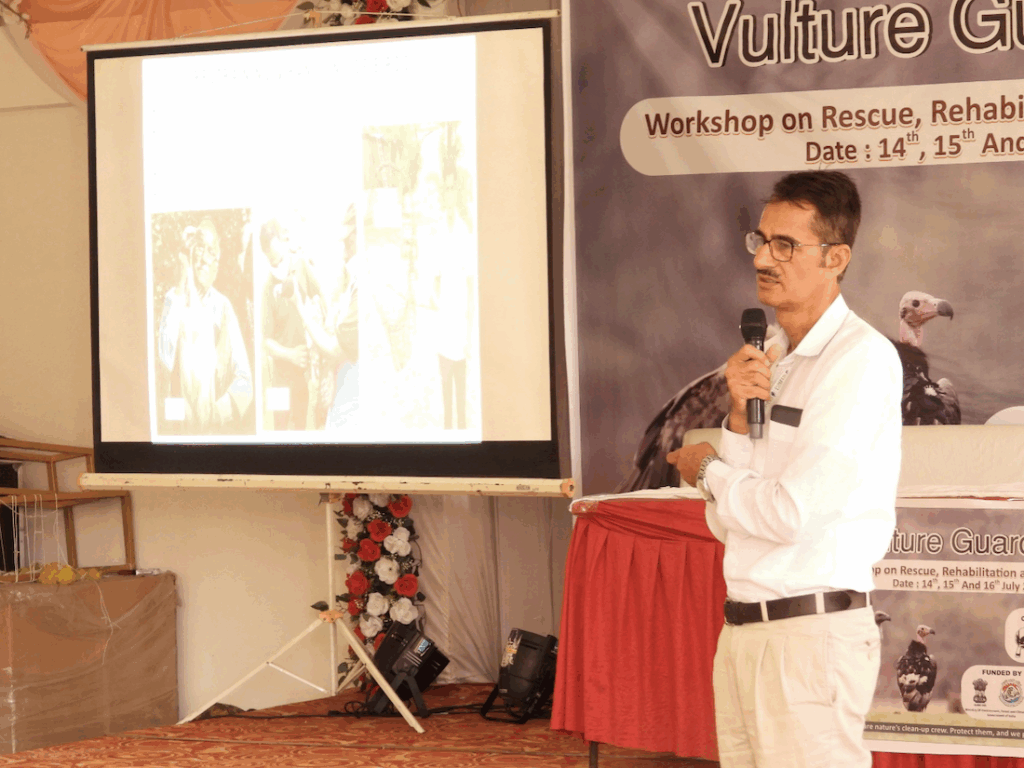
Dr. Shravan Singh Rathore, Veterinarian at JCBC Pinjore, focused on “Rescue and Rehabilitation of Injured Vultures”. He identified common threats including electrocution, poisoning, trauma, and drowning. He explained physical and behavioral signs of illness and shared techniques like keel scoring and palpation for health assessments. Bandaging methods, wing immobilization, parasite treatments, and rehabilitation practices such as sling support for weak birds were demonstrated. Dr. Rathore also discussed post-rehabilitation release planning and monitoring.
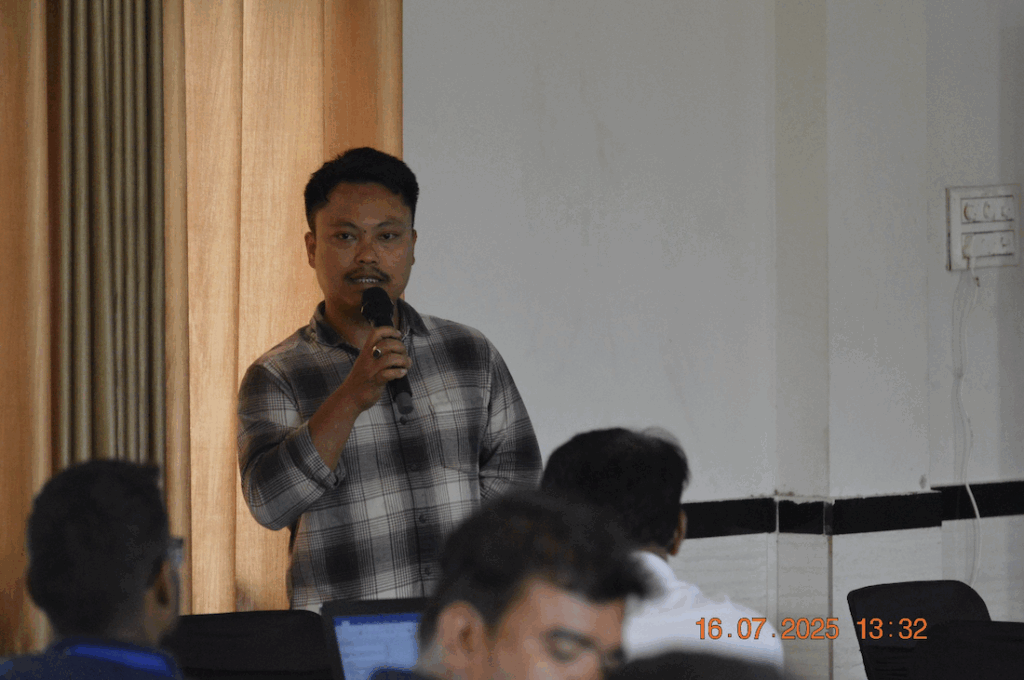
Dr. Krishna Chutia elaborated on “Rehabilitation of Vultures after Successful Treatment and Monitoring Protocol”. He explained the 45-day quarantine process for new admissions, daily observation schedules, blood/faecal testing, and biosecurity protocols. He highlighted the use of NSAID-free carcasses, preventive deworming, and health documentation. Participants learned about drug administration routes (oral, IM, IV) and the importance of proper site selection and coordination with forest officials for post-rehabilitation release.
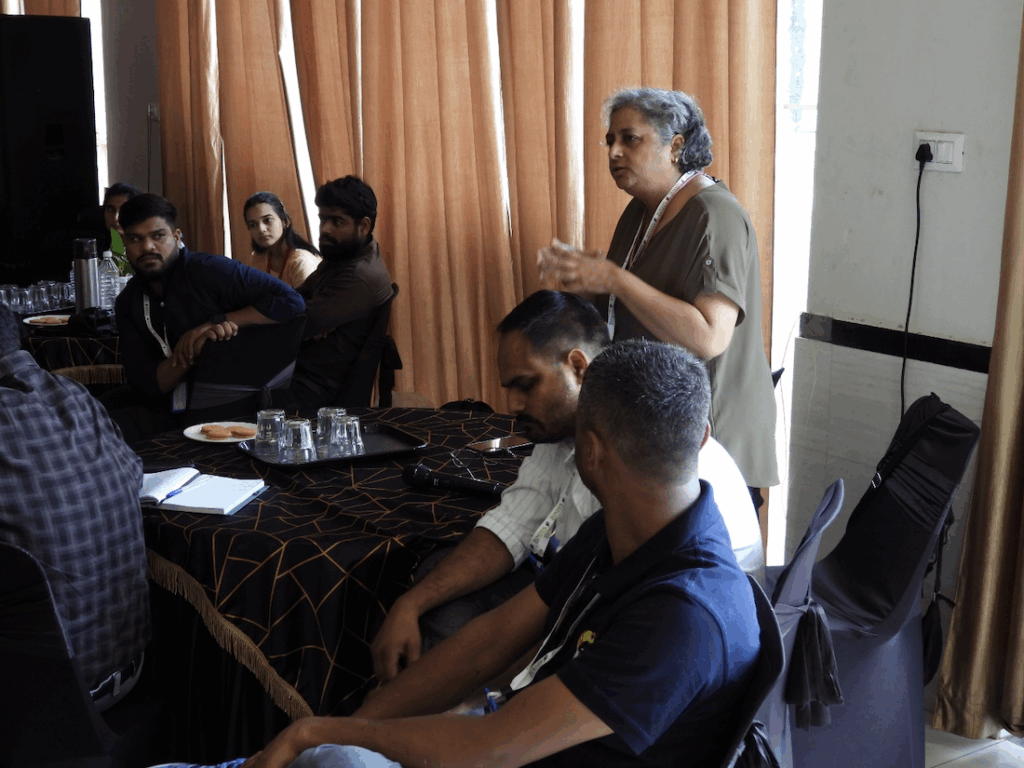
The concluding technical session, “How to Be a Vulture Advocate”, was led again by Dr. Kazveen Umrigar. She encouraged participants to raise awareness about vultures, engage in citizen science, advocate for NSAID bans, and support Vulture Safe Zones. She provided guidance on responsible social media use, policy outreach, and collaborating with gaushalas for safe carcass supply.
Valedictory Session
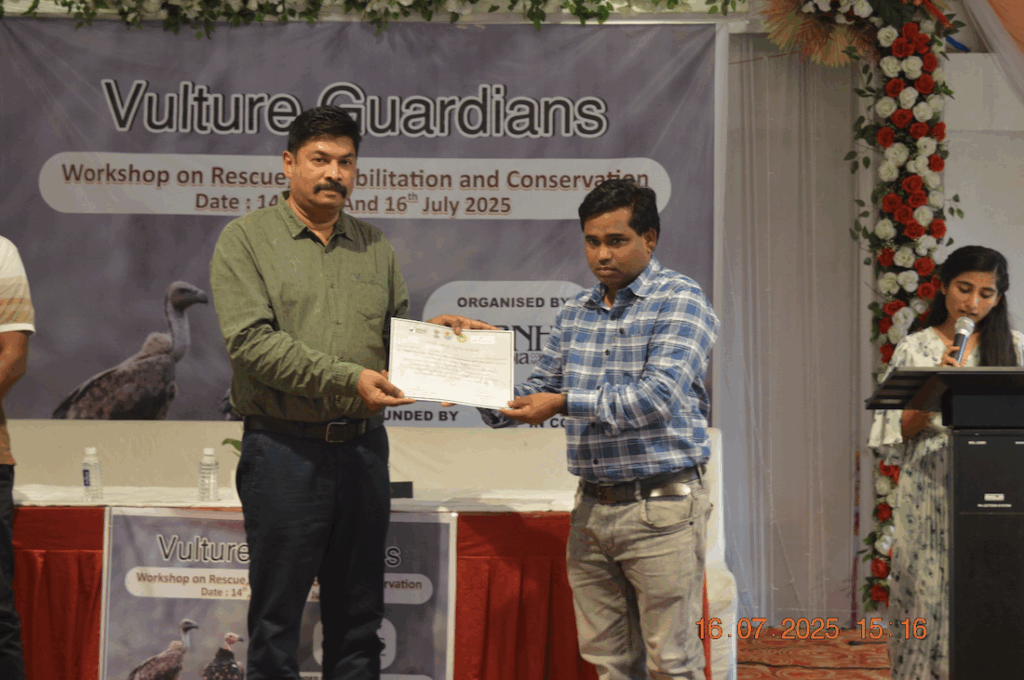
The workshop concluded with a valedictory session presided over by Shri Shubaranjan Sen, IFS, Principal Chief Conservator of Forests (Wildlife), Madhya Pradesh. Certificates were distributed, and the organizing team was commended for their efforts. Dr. Arockianathan Samson delivered a Vote of Thanks. The event successfully transformed participants into informed and empowered “Vulture Guardians”, ready to implement conservation actions across India.
Report by
Kishor Rithe, Sachin Ranade, Kazveen Umrigar, Hemant Bajpai & Arockianathan Samson
Bombay Natural History Society, Hornbill House, Opposite Lion Gate, Shaheed Bhagat Singh Road, Dr. Salim Ali Chowk, Mumbai 400 001, Maharashtra, India
Email id: kingvulture1786@gmail.com , a.samson@bnhs.org

